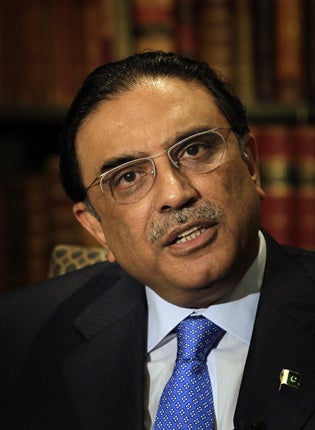It will take years to repair the flood damage in Pakistan, warns Zardari
President tells Omar Waraich that Islamists will try to take advantage of country's plight

Your support helps us to tell the story
From reproductive rights to climate change to Big Tech, The Independent is on the ground when the story is developing. Whether it's investigating the financials of Elon Musk's pro-Trump PAC or producing our latest documentary, 'The A Word', which shines a light on the American women fighting for reproductive rights, we know how important it is to parse out the facts from the messaging.
At such a critical moment in US history, we need reporters on the ground. Your donation allows us to keep sending journalists to speak to both sides of the story.
The Independent is trusted by Americans across the entire political spectrum. And unlike many other quality news outlets, we choose not to lock Americans out of our reporting and analysis with paywalls. We believe quality journalism should be available to everyone, paid for by those who can afford it.
Your support makes all the difference.Pakistan's president, Asif Ali Zardari, said yesterday that his country will need at least three years to recover from the worst floods in its history and warned that Islamist militants could exploit the "disarray".
In his first interview since the start of the crisis, Mr Zardari defended his government's response to it and his absence from Pakistan when he chose to press on with visits to London, Paris and his family's chateau in Normandy as the tragedy unfolded at home.
The weak and unpopular civilian government has been roundly criticised for failing to mount an effective response to the floods, but Mr Zardari said Pakistan never had the capacity to cater for such an eventuality. The floods, which began nearly a month ago, have destroyed or damaged 1.2 million homes, affected more than 17 million people and left 1,500 people dead, according to the United Nations.
The floods have increased fears that Islamist militants, chastened and scattered by military offensives mounted by the Pakistani army last year, may take an opportunity given by the state's failures to help the population.
That fear was underscored yesterday as three bomb attacks in northwest Pakistan killed at least 36 people. Two of the bombs exploded in the tribal areas along the Afghan border and the third in the city of Peshawar.
"I see always such organisations and such people taking advantage of this human crisis," the embattled president told a small group of reporters at the presidential palace in Islamabad. "It is again a challenge to not let them take advantage of this human crisis."
He said the "silver lining" would be if militants had also drowned. He said that he believed some of their armaments had been swept away by the waters. Mr Zardari declined to say whether the floods had closed off the possibility of an offensive in North Waziristan, the biggest militant hideout along the Afghan border and one that Washington has long wanted Pakistan to take part in.
"The army has not abandoned its posts along the border, it has probably just taken refuge under the mountains," he said. After the waters recede, "they will be there. The fight goes on on all fronts. If you're fighting for a cause and the fight becomes larger, or bigger, you don't give up".
Mr Zardari said he understood the anger that the floods, and the response to them, had generated, often heightening criticism of his government's sluggish response. Islamist charities, some with suspected links to militant groups, have rapidly provided relief to Pakistanis, already frustrated with their leaders' track record on security, poverty and chronic power shortages.
Mr Zardari, who is about to complete two years in office, warned of social disorder, while Pakistan tried to rebuild from the flooding, saying that "three years is the minimum" time to recover.
"There will be discontentment," he said. "There is no way any nation – even if it's a superpower, we've seen examples in Katrina, we've seen Haiti, we've seen examples everywhere else – can bring the same level of satisfaction that will be close to the expectations of people."
He added: "What can you tell a mother whose child drowned or the wall collapsed? She's hurting. What I can do for her that will take the pain away? All I can do is share the pain."
But he bristled at the mention of criticism of his failure to cut short a trip to Europe, particularly his decision to visit a family chateau in Normandy. "It gives me a reassurance that I'm so wanted," he said. "There is a question that I'm so wanted and so desired by the people that [they were asking], 'Why were you out?'"
"I have my own reasons for being where I was and at what time," he said. "This is a long term situation and one has to have the capacity to sustain yourself for three years, or even more, and not exhaust yourself immediately ... Anyway, that's part of the past and that's happened and that's gone and I'm here."
Officials defended the trip to Britain on diplomatic grounds after Prime Minister David Cameron's accusation that Pakistan was an exporter of terrorism.
Pakistan's permanent representative to the UN said the accusation had affected charity giving in the UK.
However, the British aid appeal yesterday topped £29m. The head of the Disasters Emergency Committee said public donations were "leading the way and shaming politicians across the world" after a slow response to an international appeal.
Mr Zardari, head of the ruling Pakistan People's Party, said he welcomed the $800m (£516m) so far raised from international donors, during a time of tough economic conditions.
Join our commenting forum
Join thought-provoking conversations, follow other Independent readers and see their replies
Comments